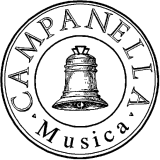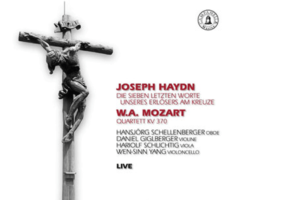On 6 April 2012, in the Catholic church in Aschau in the Chiemgau, the oboist Hansjörg Schellenberger, violinist Daniel Giglberger, violist Hariolf Schlichtig and cellist Wen-Sinn Yang came together to treat their audience to two gems of chamber music to celebrate Good Friday. The first item they played, as a small and perfectly-formed overture to the recital, was Mozart’s Quartet for Oboe and String Trio K370. The four musicians then performed Haydn’s “Seven Last Words of our Saviour on the Cross”, one of the most unusual pieces of passion music in the entire repertoire. Then occasional listener will have noticed that the work’s ending – the brief shock of the earthquake – comes after three-quarters of an hour and not, as so often happens, after five (which is usually too long): as Hansjörg Schellenberger explains in his introductory text, anyone who really knows how to distinguish between triple time and alla breve will arrive at the happy realisation that the sections marked Adagio will require a completely different tempo from that of the fairly turbulent surrounding sections, and that the “Seven Last Words” will then leave a much more profound impression than if they are misinterpreted as an undifferentiated and long-drawn-out meditation.
The fact that Hansjörg Schellenberger performs the first violin’s highly expressive part on the oboe lends this nuance-rich live recording all the appeal of the truly unique.
Tracklisting
Wolfgang Amadeus Mozart (1756-1791)
Oboenquartett KV 370
1 Allegro
2 Adagio
3 Rondeau. Allegro
Joseph Haydn (1732-1809)
Die sieben letzten Worte unseres Erlösers am Kreuze
4 Introduction
5 I) Pater, pater dimitte illis, quia nesciunt, quid faciunt
6 II) Hodie mecum eris in Paradiso
7 III) Mulier ecce filius tuus
8 IV) Deus meus, utquid dereliquisti me?
9 V) Sitio
10 VI) Consumatum est
11 VII) In manus tuas Domine, commendo spiritum meum
TT: 58:37
Artists
Hansjörg Schellenberger, Oboe
Daniel Giglberger, Violin
Hariolf Schlichtig, Viola
Wen-Sinn Yang, Cello
Reviews
☞ »Hansjörg Schellenberger entfacht mit goldenem Ton diese Atmosphäre gekonnt, ehrlich, ohne jegliche Manieriertheit und oberflächliche Professionalität. Die Tempi sind bestens gewählt, die Oboe leuchtet in hellen Farben …« das Orchester, 10/2014
☞ »… weise Meditationen, die dank des Holzblasinstruments noch eine Spur plausibler und eigenständiger wirken. … und welche Freude allen das Spiel gemacht hat, hört man deutlich heraus.« KulturSPIEGEL, 1.04.2015


